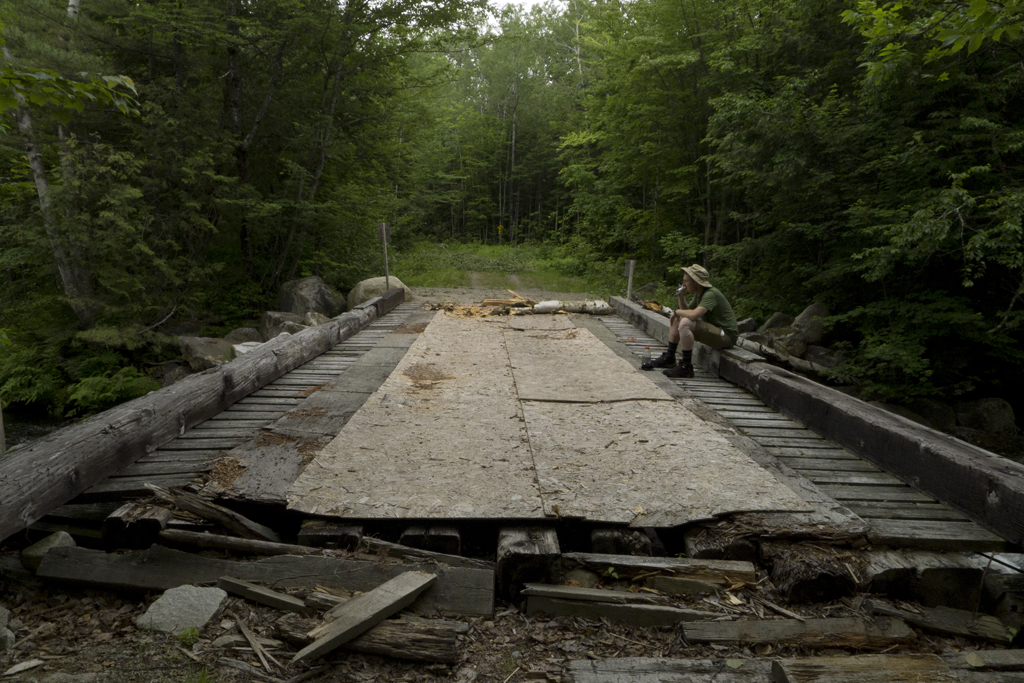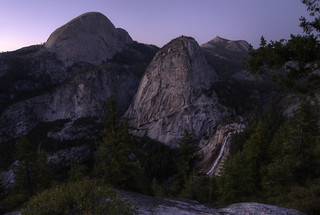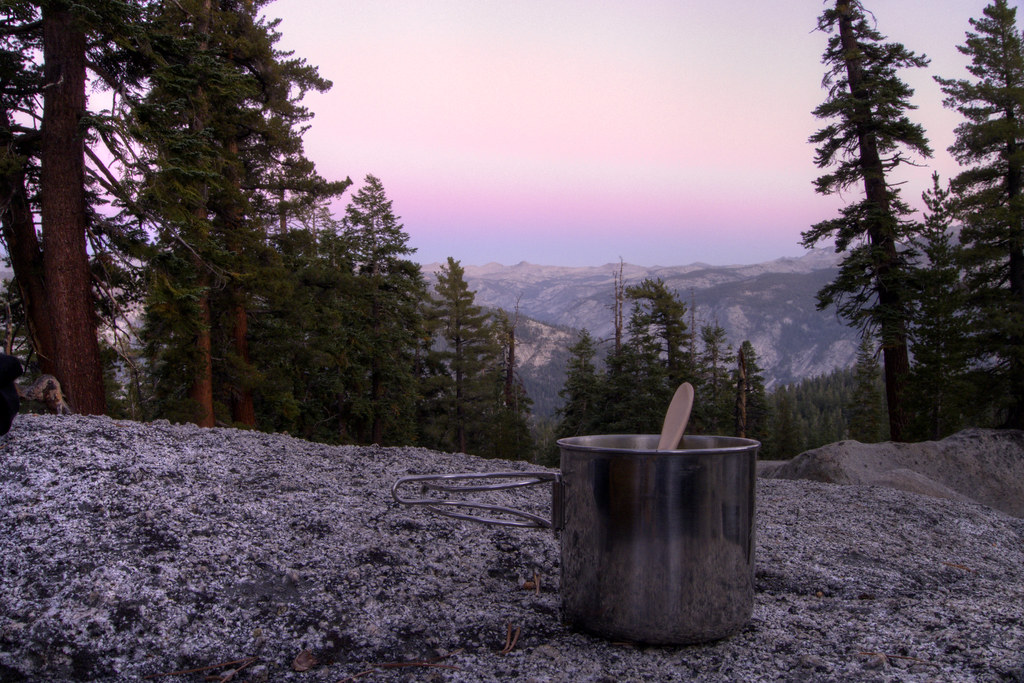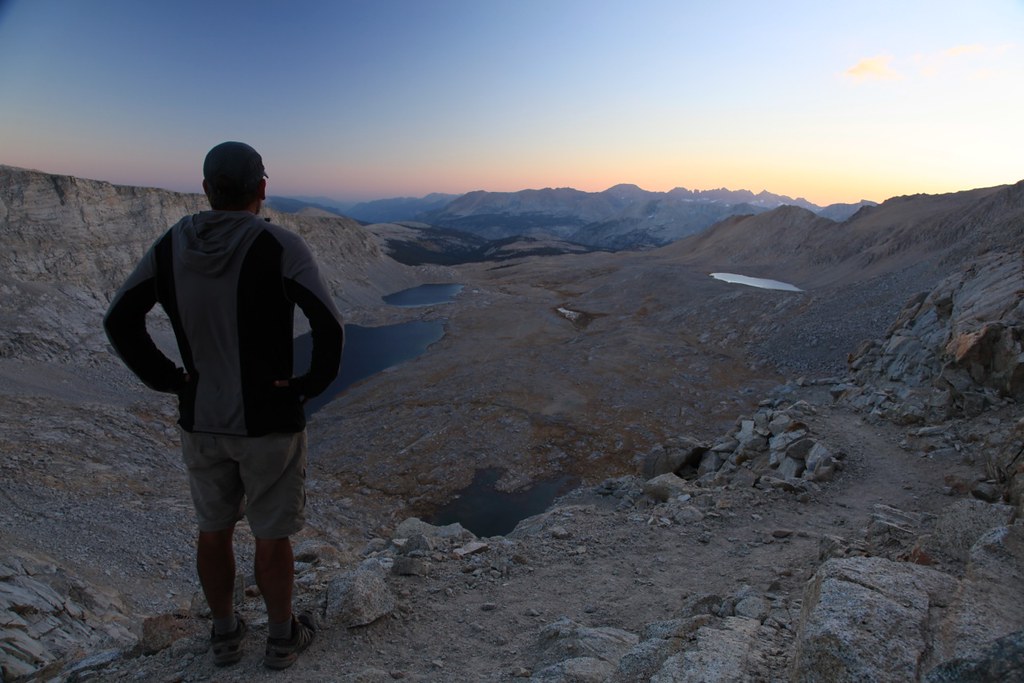 |
| (Photo: Snack Break on the Appalachian Trail) |
In part two of my interview with New Orleans Saints Sports Dietitian, Tavis Piattoly, we talked about the best backpacking foods, but on a long-distance hike, I’d also like to know which are the best town foods. Life on the trail often leads to nutritional deficiencies, but in town we have new choices available.
RG: When thinking of a typical trail diet, what vitamins and nutrients are likely to be limited and what should we try to eat more of when we are in town?
TP: This would depend on the town and what's available. Eating clean as often as possible will always be your best option. I feel fresh fruits, veggies, and lean protein would be three staples you want to eat when you get in town that you probably don't eat enough of while hiking. Although you need the calories (which fruits and veggies don't have much of), you also need the nutrients and antioxidants for immune support. You can pour Olive Oil or Cheese on your veggies for extra calories as well as having a few extra portions of carbohydrates to restore the gas tank.
Another common question in the forums and on the Facebook page have been about binge eating episodes, the common thru-hiker practice of eating small frequent meals at a daily calorie deficit, to reduce pack weight and then binge eating while in town. With town visits on a thru-hike usually happening every 3-7 days, would you discourage this practice completely or is there an acceptable amount of short-term calorie restriction?
First, I wouldn't recommend restricting calories on a trail, especially when you're burning calories at the rate you do. This could lead to fatigue sooner than later. Since you usually go into a caloric deficit within a few days, I would say you don't want to do this any longer than 3-4 days without starting to see some significant fatigue, especially if you’re not consuming enough fluids.
It will vary person to person as well as it will depend on the body fat levels of the Thru-Hiker. Someone with a higher body fat will do better utilizing his/her fat stores where the extra lean person will struggle with being in a deficit a little more as their metabolism is a little higher and they burn calories faster. This could lead to fatigue sooner than later.
A large meal due to being in a caloric deficit will be advantageous every 2-4 days as your body will want and need those calories. I would also recommend doing this at night so you can store some additional extra calories as fat. This will be burned off quickly the next day.
Inflammation is frequently a problem for me on a long trail and I’m certainly not alone. Ibuprofen is taken so routinely by some, that we call it Vitamin-I, because we pop a pill (or three) every morning without even thinking about it. Does this pose a health concern with regular daily usage? Are there foods that more safely support joint health and reduce muscle and joint inflammation? Conversely, are there foods that increase inflammation?
First, Ibuprofen. Most important is making sure you don't cause stomach bleeding with overuse. (See: Proper Use and Precautions) There are plenty of foods and spices that reduce inflammation:
Fresh Fruits and Veggies - Excellent anti-inflammatory foods (Berries, Pineapple)
Fish Oil Supplements - Nordic Naturals are the best in my opinion
Curry or Turmeric Powder/Supplements - Great anti-inflammatory agent
Spices - Like Oregano, Curry, Cinnamon, Basil, etc., are anti-inflammatory
Glutamine - Great for the immune system and muscle
Greens Powders - High in nutrients and lighter in weight
Fruit and Veggie Extract Gummies by Juice Plus - Great option if you can't carry too many fruits and veggies
Foods that promote inflammation are: High sugar foods, foods made with Omega-6 Fatty Acids (chips, cookies, pies, French fries, anything fried in oil, etc.), Foods high in saturated fat (high fat animal products, high fat cheese, etc.).
SawnieRobertson on the WhiteBlaze.net forums asks if you have any special advice for those who are hypothyroid.
Continue to eat frequently (every 2-3 hours), take your medicine if prescribed by your doctor, and eat lean protein at every meal as it can be thermogenic in nature.
Mizirlou, also from WhiteBlaze.net, mentioned he has suffered from Acute Mountain Sickness in the past, so wanted to know if you had something to say about high altitude nutrition. The Pacific Crest Trail (my next hike), for example, can vary from 1,000 feet above sea level to over 14,000. Aside from the energy expended to get up the mountain, will nutritional requirements change simply by being at a high elevation?
I thought it would be more appropriate to credit the source when answering this next question as Wayne has an excellent review on his site that can answer this better than I can. The link will provide a comprehensive answer to this question: http://www.wms.org/news/altitude.asp
As a non-expert, there are probably many questions that I don’t even know to ask. Are there any important questions I haven't asked that you'd like to talk about?
One component of nutrition that is often over-looked in all activities and sports is the significance of hydration. The first sign of fatigue is usually related to being dehydrated. We often wait until we receive cues of thirst before we drink but we should drink on a schedule, especially when going on a hike longer then 3-4 hours which is nothing compared to what the experienced hiker does. Regardless of the season (fall, winter, summer), hikers will excrete water through urine and sweat and without proper re-hydration strategies, the journey could become more difficult even for the experienced and well trained hiker.
As you get 2 hours into the hike, it's important to start replacing electrolytes to avoid an imbalance which could lead to many issues from cramping to irregular heart beats (if potassium and magnesium get too low). To avoid adding more weight to a pack, I like using the NUUN tablets as well as a product called The Right Stuff. The Right Stuff is excellent for heavy sweaters. Both are easy to add to water and drink. My rule of thumb is to consume 8-12 oz of fluid every 15 minutes or 16-24 oz every 30 minutes. Don't wait until you're thirsty as you'll already be 1% dehydrated.
And finally, one more important question from the forum at WhiteBlaze.net. Beer as a sports drink? Carb loading?
The average 12 oz beer has approximately 13 grams of carbohydrates, but I wouldn't rely on it to carb load as it will have a significant dehydrating effect on the body if consumed in excess. I'm sure this wouldn't make for an enjoyable hike the next day. Stick with Tequila shots. :)
I will definitely keep that in mind, Tavis, and one again thanks for answering all of our questions! As I said in part one of this interview, the good nutrition advice online doesn't often take into account the limitations that long-distance hikers face. I will now be better prepared at my next resupply.
Also, thanks to all of you that contributed questions. You had many I hadn't considered, so you made this a more thorough and informative interview. If you have further questions or comments, please leave them in the comments section below.
RG: When thinking of a typical trail diet, what vitamins and nutrients are likely to be limited and what should we try to eat more of when we are in town?
TP: This would depend on the town and what's available. Eating clean as often as possible will always be your best option. I feel fresh fruits, veggies, and lean protein would be three staples you want to eat when you get in town that you probably don't eat enough of while hiking. Although you need the calories (which fruits and veggies don't have much of), you also need the nutrients and antioxidants for immune support. You can pour Olive Oil or Cheese on your veggies for extra calories as well as having a few extra portions of carbohydrates to restore the gas tank.
Another common question in the forums and on the Facebook page have been about binge eating episodes, the common thru-hiker practice of eating small frequent meals at a daily calorie deficit, to reduce pack weight and then binge eating while in town. With town visits on a thru-hike usually happening every 3-7 days, would you discourage this practice completely or is there an acceptable amount of short-term calorie restriction?
First, I wouldn't recommend restricting calories on a trail, especially when you're burning calories at the rate you do. This could lead to fatigue sooner than later. Since you usually go into a caloric deficit within a few days, I would say you don't want to do this any longer than 3-4 days without starting to see some significant fatigue, especially if you’re not consuming enough fluids.
It will vary person to person as well as it will depend on the body fat levels of the Thru-Hiker. Someone with a higher body fat will do better utilizing his/her fat stores where the extra lean person will struggle with being in a deficit a little more as their metabolism is a little higher and they burn calories faster. This could lead to fatigue sooner than later.
A large meal due to being in a caloric deficit will be advantageous every 2-4 days as your body will want and need those calories. I would also recommend doing this at night so you can store some additional extra calories as fat. This will be burned off quickly the next day.
Inflammation is frequently a problem for me on a long trail and I’m certainly not alone. Ibuprofen is taken so routinely by some, that we call it Vitamin-I, because we pop a pill (or three) every morning without even thinking about it. Does this pose a health concern with regular daily usage? Are there foods that more safely support joint health and reduce muscle and joint inflammation? Conversely, are there foods that increase inflammation?
First, Ibuprofen. Most important is making sure you don't cause stomach bleeding with overuse. (See: Proper Use and Precautions) There are plenty of foods and spices that reduce inflammation:
Fresh Fruits and Veggies - Excellent anti-inflammatory foods (Berries, Pineapple)
Fish Oil Supplements - Nordic Naturals are the best in my opinion
Curry or Turmeric Powder/Supplements - Great anti-inflammatory agent
Spices - Like Oregano, Curry, Cinnamon, Basil, etc., are anti-inflammatory
Glutamine - Great for the immune system and muscle
Greens Powders - High in nutrients and lighter in weight
Fruit and Veggie Extract Gummies by Juice Plus - Great option if you can't carry too many fruits and veggies
Foods that promote inflammation are: High sugar foods, foods made with Omega-6 Fatty Acids (chips, cookies, pies, French fries, anything fried in oil, etc.), Foods high in saturated fat (high fat animal products, high fat cheese, etc.).
SawnieRobertson on the WhiteBlaze.net forums asks if you have any special advice for those who are hypothyroid.
Continue to eat frequently (every 2-3 hours), take your medicine if prescribed by your doctor, and eat lean protein at every meal as it can be thermogenic in nature.
Mizirlou, also from WhiteBlaze.net, mentioned he has suffered from Acute Mountain Sickness in the past, so wanted to know if you had something to say about high altitude nutrition. The Pacific Crest Trail (my next hike), for example, can vary from 1,000 feet above sea level to over 14,000. Aside from the energy expended to get up the mountain, will nutritional requirements change simply by being at a high elevation?
I thought it would be more appropriate to credit the source when answering this next question as Wayne has an excellent review on his site that can answer this better than I can. The link will provide a comprehensive answer to this question: http://www.wms.org/news/altitude.asp
As a non-expert, there are probably many questions that I don’t even know to ask. Are there any important questions I haven't asked that you'd like to talk about?
One component of nutrition that is often over-looked in all activities and sports is the significance of hydration. The first sign of fatigue is usually related to being dehydrated. We often wait until we receive cues of thirst before we drink but we should drink on a schedule, especially when going on a hike longer then 3-4 hours which is nothing compared to what the experienced hiker does. Regardless of the season (fall, winter, summer), hikers will excrete water through urine and sweat and without proper re-hydration strategies, the journey could become more difficult even for the experienced and well trained hiker.
As you get 2 hours into the hike, it's important to start replacing electrolytes to avoid an imbalance which could lead to many issues from cramping to irregular heart beats (if potassium and magnesium get too low). To avoid adding more weight to a pack, I like using the NUUN tablets as well as a product called The Right Stuff. The Right Stuff is excellent for heavy sweaters. Both are easy to add to water and drink. My rule of thumb is to consume 8-12 oz of fluid every 15 minutes or 16-24 oz every 30 minutes. Don't wait until you're thirsty as you'll already be 1% dehydrated.
And finally, one more important question from the forum at WhiteBlaze.net. Beer as a sports drink? Carb loading?
The average 12 oz beer has approximately 13 grams of carbohydrates, but I wouldn't rely on it to carb load as it will have a significant dehydrating effect on the body if consumed in excess. I'm sure this wouldn't make for an enjoyable hike the next day. Stick with Tequila shots. :)
I will definitely keep that in mind, Tavis, and one again thanks for answering all of our questions! As I said in part one of this interview, the good nutrition advice online doesn't often take into account the limitations that long-distance hikers face. I will now be better prepared at my next resupply.
Also, thanks to all of you that contributed questions. You had many I hadn't considered, so you made this a more thorough and informative interview. If you have further questions or comments, please leave them in the comments section below.
- - -
Tavis Piattoly, MS, RD, LDN is the Sports Dietitian and Nutrition Consultant for the New Orleans Saints, New Orleans Hornets, and the Tulane University Athletic Department where he coordinates nutritional assessments, provides nutrition education, and develops individual meal plans for athletes to improve their health, performance, and recovery. In addition, he consults for numerous high schools athletic programs throughout the state of Louisiana. Futhermore, Tavis worked closely with Roy Jones Jr. and Bernard Hopkins to help them retain their boxing titles and has been working with Lance Berkman since 2011.
He is also the co-founder and Director of Sports Nutrition education for My Sports Dietitian (www.mysportsd.com), an online sports nutrition education company to help High School and College Athletes improve their eating habits to enhance performance, recovery, and health through the guidance of a Licensed Sports Dietitian.
Tavis obtained a Master’s of Science Degree in Exercise Physiology from Louisiana State University and a Bachelors of Science Degree in Nutrition and Dietetics from Louisiana State University. He is a registered and licensed Dietitian/Nutritionist. In addition, he serves on the Louisiana High School Athletic Association Sports Medicine Advisory Board.
Related Articles:
Part One: Nutrition for Thru-hikers: An Interview with Sports Dietitian, Tavis Piattoly
Part Two: Nutrition for Thru-hikers: An Interview with Sports Dietitian, Tavis Piattoly
Cooking Supplies and How to Make an Alcohol Stove
He is also the co-founder and Director of Sports Nutrition education for My Sports Dietitian (www.mysportsd.com), an online sports nutrition education company to help High School and College Athletes improve their eating habits to enhance performance, recovery, and health through the guidance of a Licensed Sports Dietitian.
Tavis obtained a Master’s of Science Degree in Exercise Physiology from Louisiana State University and a Bachelors of Science Degree in Nutrition and Dietetics from Louisiana State University. He is a registered and licensed Dietitian/Nutritionist. In addition, he serves on the Louisiana High School Athletic Association Sports Medicine Advisory Board.
Related Articles:
Part One: Nutrition for Thru-hikers: An Interview with Sports Dietitian, Tavis Piattoly
Part Two: Nutrition for Thru-hikers: An Interview with Sports Dietitian, Tavis Piattoly
Cooking Supplies and How to Make an Alcohol Stove
A Backpacker's Life by Ryan Grayson is licensed under a
Creative Commons Attribution-NonCommercial-NoDerivs 3.0 Unported License.


com-s.jpg)
com-s.jpg)
com-s.jpg)
com-s.jpg)



